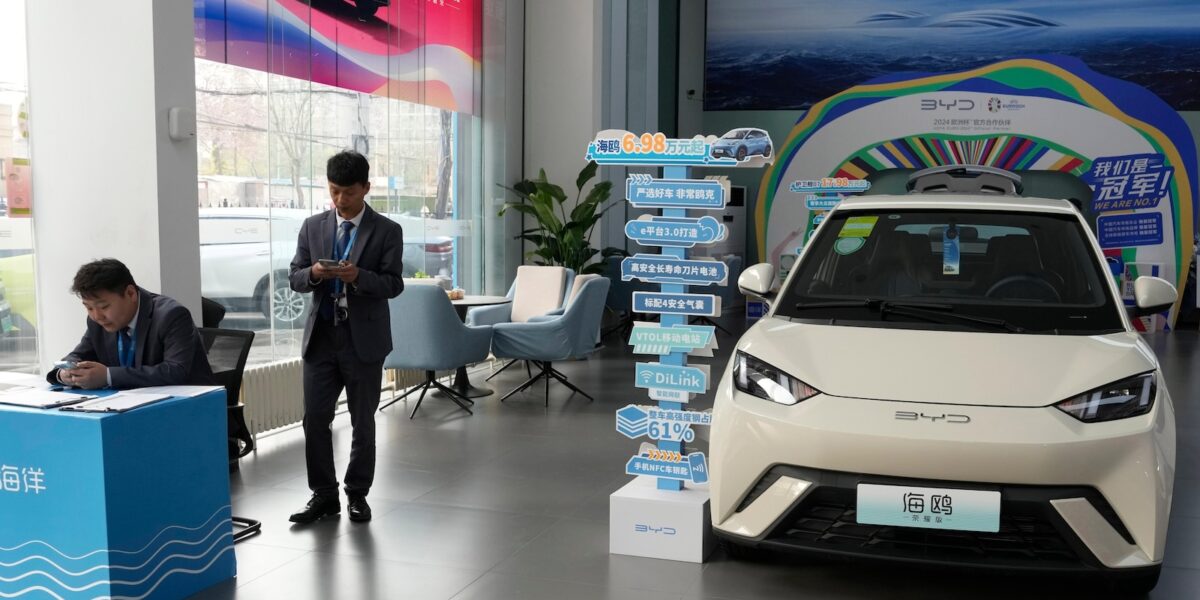WASHINGTON — It’s a scenario that terrifies America’s auto industry.
Chinese carmakers set up shop in Mexico to exploit North American trade rules. Once in place, they send ultra-low-priced electric vehicles streaming into the United States.
As the Chinese EVs go on sale across the country, America’s homegrown EVs — costing an average of $55,000, roughly double the price of their Chinese counterparts — struggle to compete. Factories close. Workers lose jobs across America’s industrial heartland.
Ultimately, it would all become a painful replay of how government-subsidized Chinese competition devastated American industries from steel to solar equipment over the past quarter-century. This time, it would be electric vehicles, which America’s automakers envision as the core of their business in the coming decades.
Low-priced Chinese EVs pose a potentially “extinction-level event’’ for America’s auto industry, the Alliance for American Manufacturing has warned.
Especially worrisome: The 2020 U.S.-Mexico-Canada Agreement would potentially let Chinese cars assembled in Mexico enter the United States duty-free or at a nominal 2.5% tariff rate. Either way, China could sell its EVs well below typical U.S. prices.
To defuse the threat, the U.S. has options. Customs officials could rule that Chinese EVs don’t qualify for the low-duty or duty-free benefits of being made in Mexico. U.S. policymakers could also pressure Mexico to keep Chinese vehicles out of that country. Or they could bar Chinese EVs from the U.S. on the grounds that they would threaten America’s national security.
The threat from Beijing is emerging just as U.S. automakers face slowing EV sales. High prices and a shortage of charging stations are keeping many American consumers away.
Cheap Chinese EVs might help by pushing down prices, accelerating sales and encouraging investment in charging stations. “It would be cheaper just to let the Chinese cars come in, forget all the tariffs and subsidies, let the market figure it out,’’ said Christine McDaniel, a senior research fellow at George Mason University’s Mercatus Center. “Yes, it would be disruptive. But EVs would get on the road in the U.S. a lot faster.”
At stake is who stands to dominate the manufacture and sale of zero-emissions electric vehicles.
China has so far taken a daunting lead. It accounted for nearly 62% of the 10.4 million battery-powered EVs produced worldwide last year. The United States made 1 million — less than 10% of the total, according to GlobalData.
Chinese automakers have made remarkable strides holding down costs. China’s BYD last year introduced a small EV called the Seagull that sells for just $12,000 in China ($21,000 for a version sold in four Latin American countries). The Seagull’s lightweight design allows it to go farther per charge on a smaller battery. BYD has said it’s considering building a factory in Mexico — but only for the Mexican market.
Critics note that BYD and other Chinese EV makers have achieved their cost efficiencies thanks to heavy subsidies from the Beijing government. The Chinese government spent more than $130 billion on EVs and other green vehicles from 2009 through 2021, according to the Center for Strategic and International Studies.
Last month, President Joe Biden raised the tariff on Chinese EVs, from the 27.5% established during Donald Trump’s presidency to 102.5%. It’s meant to price even the bargain-priced BYD Seagull out of the U.S. market. (The European Union says it plans to impose provisional tariffs of up to 38.1% on Chinese EVs for four months starting in July.)
The U.S.-Mexico-Canada Agreement, though, potentially lets vehicles assembled by Chinese firms in Mexico enter the U.S. at a much lower tariff or none at all. If made-in-Mexico cars met the USMCA’s requirements, they could enter the United States duty-free. At least 75% of a car and its parts would have to come from North America. And at least 40% of it must originate in places where workers earn at least $16 an hour.
Still, for a Chinese EV maker like BYD, qualifying for duty-free treatment under the USMCA would be difficult. “Even North American automakers have a challenging time reaching those thresholds,” said Daniel Ujczo of the Thompson Hine law firm.
But there’s an easier way Chinese EV makers could use Mexico to try to dodge Biden’s killer 102.5% import tax: They would have to pay only 2.5% — the tax imposed on most cars imported to the United States — if they could show that assembling their EVs in Mexico involved a “substantial transformation’’ that essentially transformed them from Chinese into Mexican cars.
U.S. officials could reject the notion that a substantial transformation occurred during the assembly process. But the U.S. would struggle to prevail if that decision were challenged in the U.S. Court of International Trade, “given the substantial changes that typically take place in automotive assembly factories,’’ David Gantz, a fellow at Rice University’s Baker Institute for Public Policy, has written.
The “most effective and quickest’’ way to keep Chinese EVs out of the United States, Gantz argues, would be to block them on national security grounds. Today’s EVs, after all, are loaded with cameras, sensors and other technological gizmos that could collect images from the cars’ surroundings and sensitive personal information from EV drivers. And China isn’t merely an economic competitor. It’s a geopolitical adversary — and potentially a military one, too.
“U.S. fears regarding possible use of connected vehicles to spy on military installations or powerplants are not irrational,’’ Gantz wrote. In February, Biden ordered his Commerce Department to investigate the technology in Chinese “smart cars,’ ‘ a potential prelude to blocking Chinese EVs on national security grounds.
____
AP Auto Writer Tom Krisher in Detroit contributed to this report.


